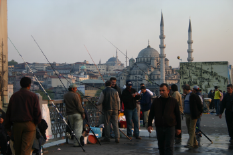
1,000 civil society representatives have been accredited to attend the Annual Meetings in Istanbul.
The IMF and Civil Society
Embracing Dialogue with Civil Society
October 1, 2009
A diverse group of civil society representatives has arrived in Turkey for the 2009 World Bank and IMF Annual Meetings. The Civil Society Policy Forum will offer a dynamic and important platform for dialogue between the IMF and CSOs.
The 2009 World Bank and IMF Annual Meetings in Istanbul are hosting 1000 civil society organizations (CSOs) from around the world.
CSO participation in the World Bank and IMF Spring and Annual Meetings has grown in recent years as part of an effort to make the meetings more transparent and to encourage public debate on development issues. The IMF believes that a strong participation of CSOs enhances the quality and diversity of policy dialogue.
CSO Policy Forum
This year’s Annual Meetings are particularly important in view of the global financial crisis and the Civil Society Policy Forum is offering an interesting set of events and sessions. The forum brings together World Bank and IMF staff, CSO representatives, academics, government officials, think tanks, participants from the private sector and others for some interactive discussions on a broad range of topics.
These include the impact of the global crisis on low-income and emerging countries, climate change, human rights, accountability of International Financial Institutions, and transparency. The forum starts on Thursday, October 2 with an orientation session for sponsored CSOs from different countries in Africa, Asia, the Middle East and Latin America. It will officially end on Wednesday, October 7.
The IMF, World Bank, and CSOs have worked together to organize the sessions of this year’s forum, following a model established for the 2003 Singapore meetings. A planning group was established, including 18 CSO representatives from organizations in most regions and several Turkish organizations, to help organize the CSO events at the meetings, including the policy forum, and a townhall meeting with the IMF Managing Director Dominique Strauss-Kahn and World Bank President Robert Zoellick.
A particular focus of the sessions organized by the IMF Civil Society team will be discussions with CSOs on the impact of the global financial crisis on member countries, the response by the institutions, and recent IMF initiatives to support economic recovery, particularly in Africa and emerging Europe.
Sponsorship program
Despite the recent increase in participation of CSO representatives in the Annual Meetings, the vast majority have traditionally come from developed countries, especially Europe and the U.S.
In order to address this imbalance, a few years ago the IMF and World Bank’s External Relations Departments launched an effort to sponsor CSO representatives and journalists from developing countries so they could participate in the Annual Meetings. As a result, CSOs were sponsored for the Annual Meetings in Doha (2003), Singapore (2006), and Washington (2007 and 2008).
With support from donor countries—Norway and the UK this year—the IMF and the World Bank are covering the expenses of 60 CSO sponsored representatives and journalists from low-income countries (LICs). This includes airfare, hotel, and other travel costs. A conscious effort was made to achieve gender balance—half of those selected are women, with a special focus on East Asia, Central Europe, and Africa. Other sponsored CSOs are coming from Latin America and the Middle East.
Over the years, the IMF has become more transparent and has sought to become more accountable, not only to the governments of its member countries, but also to the broader public. IMF country missions, for example in Africa, regularly meet with CSOs. “Our missions and Resident Representatives have really stepped up their contacts with civil society and parliaments in recent years, which I think has helped us to be better understood and has built more ownership for the economic programs we support,” said Roger Nord, Senior Advisor in the IMF’s African Department. “It’s a slow process, but I think a lot of progress has been made and CSOs appreciate that we are much more open than we used to be.”
IMF Governance Reform: The Fourth Pillar
A most recent example of the IMF’s engagement with CSOs has been the extensive consultation on the governance reform process. Known as the “Fourth Pillar,” the consultation involved 200 civil society representatives. New Rules for Global Finance was identified as the CSO that would serve as coordinator, setting up a website outside the IMF to enable CSOs to consult among themselves, and organizing several videoconferences from about 50 countries to ensure diverse CSO participation from different regions.
With the consultation completed, CSOs have presented to the IMF’s Executive Directors and management a paper with their recommendations and demands relating to IMF reforms. The recommendations will be presented to the IMF’s Managing Director in Istanbul on October 1 where 30 CSOs have been invited to participate in the meeting that will be chaired by Jo Marie Griesgraber of New Rules for Global Finance.
